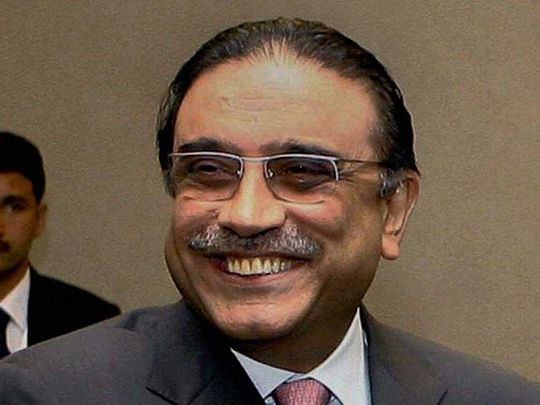
A widely publicised verbal attack by Pakistan’s former president Asif Ali Zardari targeting the county’s army, has laid bare his inability to appreciate the country’s toughest challenges. Referring to “the character assassination of his party [Pakistan Peoples Party or PPP]” Zardari’s warning to the army of exposing the so called past misdeeds of the generals simply sounded hollow.
The outburst came as the army continues with an increasingly popular clean-up operation across the southern port city of Karachi, the provincial capital of Sindh, which is ruled by the PPP. The army’s campaign has targeted criminal gangs, including those backed by politicians and who are involved in cases ranging from kidnapping and extortion to outright armed robberies and land-grabs. It has followed one of the worst periods of corruption and breakdown of law and order in the history of the city that has a population of about 20 million.
To the PPP’s discredit, Qaim Ali Shah, a Zardari loyalist and Chief Minister of Sindh, has simply failed to stem the rot on his home turf. Shah has presided over a period of misrule across a city that is widely dubbed as Pakistan’s business capital. And yet Shah remains in place mainly for his loyalty to his boss.
The case of Karachi and Shah says much about the disconnect across Pakistan with the country’s political class becoming immune to the day to day challenges faced by ordinary citizens. It also bears testimony to the fact that the rank and file of Pakistanis have become so disillusioned with the ruling class that the idea of a flourishing democracy has become the subject of popular lament.
Zardari’s own checkered past is worth remembering too. As the scion of a mid-level political family of Sindh, Karachi’s Bambino cinema was once among his prized assets. The former president rose to fame as the husband of the late prime minister Benazir Bhutto. However, his political journey since his association with Benazir has seen many ups and downs.
Once dubbed in the media as “Mr 10 per cent” — the supposed commission one needed to pay to facilitate bagging of contracts — Zardari’s meteoric rise happened after Benazir’s assassination in December 2007. His election as Pakistan’s president in 2008 in part culminated into a series of events that eventually brought the PPP to power in Islamabad. This was made possible largely due to the nationwide sympathy vote following Benazir’s killing.
And yet the party’s subsequent five-year rule became a story of many broken promises and disappointments ranging from a failure to tackle a mounting energy crisis and a growing Taliban insurgency, to stories of unbridled corruption. Zardari and his political cronies have together overseen the shrinking appeal of the PPP — once known as Pakistan’s most formidable federal political outfit armed with liberal credentials. In many ways, the ups and downs of the PPP can squarely be associated with Zardari’s imprint on the party, turning it effectively from a national political force to a provincial one.
Significant dent
As for his reference to the past deeds of Pakistan’s army generals, Zardari seems to simply miss the point. While a large number of Pakistanis associate many of the country’s challenges with its failure to evolve democratically, the foremost issue today must only be about meeting the challenge of terrorism. To that end, the campaign by the Pakistan army across the country, including Karachi, appears to have made a significant dent in Taliban-led militant groups and criminal gangs. Perhaps one of the most hilarious elements of Zardari’s remarks was indeed the threat to shut down Pakistan from the north to the south to defy the army. But it is a threat that essentially suggests the fantasy world surrounding the former president.
Unlike the late Benazir, whose sacrifices for democracy are well documented, Zardari’s case is different. Though jailed on corruption charges, Zardari simply does not have the political and democratic clout to match those of his late spouse.
And last but not least, Zardari’s oblique reference to the army chief’s three-year tenure being no match for the former president’s open-ended leadership of his party, only suggests that he indeed is out of sync with reality. Indeed, each tenure of the army chief lasts three years. And yet, the army works as an institution where many legacies are inherited by one chief from another. It is therefore important to appreciate that the decision to clean up Karachi, as part of a nationwide campaign, has been taken by the army, with the certainty of Pakistan’s next army chief continuing to follow in the footsteps of his predecessor.
Zardari’s comments have presented Pakistan’s political class with a dilemma. Targeting the army remains a favourite sport for many in Pakistan’s civil society, media and for politicians. However, critics of the army must step back and think if interrupting the ongoing campaign against criminality in Karachi will indeed help consolidate Pakistan’s democratic journey. On the contrary, a retreat from the Karachi campaign runs the risk of only emboldening the likes of the Taliban.
Ultimately, Zardari’s meaningless rant deserves to be roundly condemned at a time when Pakistan needs to press ahead with its ongoing campaign, the outcome of which will seal the fate of the south Asian country. In the final analysis, its clear that Zardari has blundered as few Pakistani politicians before.
Farhan Bokhari is a Pakistan-based commentator who writes on political and economic matters.









